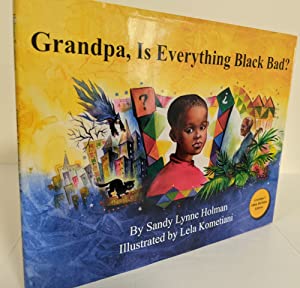Grandpa, Is Everything Black Bad? by Sandy Lynne Holman
When Montsho, an African American boy, asks a question to his granddad "Is everthing black terrible?", his granddad clarifies to him about his African legacy and how his black skin and his legacy are exceptionally brilliant things. [1]
Summary
A child named Montsho asks a question to his beloved granddad about black, terrifying evenings, black eyes, black cats that bring awful luckiness, dark as the color of grieving, negative stereotypes on television and also near to home, about why his close relative calls him the "dark sheep of the family" since he is darker than his brothers. Grandpa embraces him close, beats an awesome African drum, and tells Montsho that black is wonderful. Good looking double-page spreads recognition the history, soul, and culture of Montsho's African legacy: "Africa is wonderful and so are its individuals with their lovely, black skin." Children will appreciate both the candor and the comfort. [2]
Pros
This book is wonderfully written and beautifully illustrated! It digs inside of a child's perception of race, legacy, and skin color. The messages of self-love and African pride taught by the Granddad are touching and will warm the hearts of the Parents whereas educating the kids a sense of pride! A must studied for children of all ages and nationalities. [3]
J-Lynn Van Pelt as a verified reader commented about this book, she said that the purpose of this book was clear, to neutralize the negative messages that African American children accepted almost because of their skin color. It lists all the ways society dichotomizes dark and white symbolism through the questions of a young boy. At that point, his gradfather takes him on a travel where he told the boy around his "heritage."It describes the magnificence of Africa and clarified how Africans contributed to world history which leads to the chant, "Be glad of your black skin and the love you have got within and keep in mind your legacy is African." The story closes by the boy asking his grandpa in case white people have legacy as well. The grandpa briefly anwers yes and talks about European Americans. It ends as in case another book may well be coming about European American legacy. [4]
References
- ↑ https://www.abebooks.com/Grandpa-Everything-Black-Bad-Sandy-Lynne/22582493544/bd
- ↑ https://www.abebooks.com/Grandpa-Everything-Black-Bad-Sandy-Lynne/22582493544/bd
- ↑ https://www.amazon.com/Grandpa-Everything-Black-Sandy-Holman/product-reviews/0964465507/ref=cm_cr_arp_d_paging_btm_next_2?ie=UTF8&reviewerType=all_reviews&pageNumber=2
- ↑ https://www.bookdepository.com/Grandpa-Is-Everything-Black-Bad-Sandy-Holman-Lynne/9780964465503
